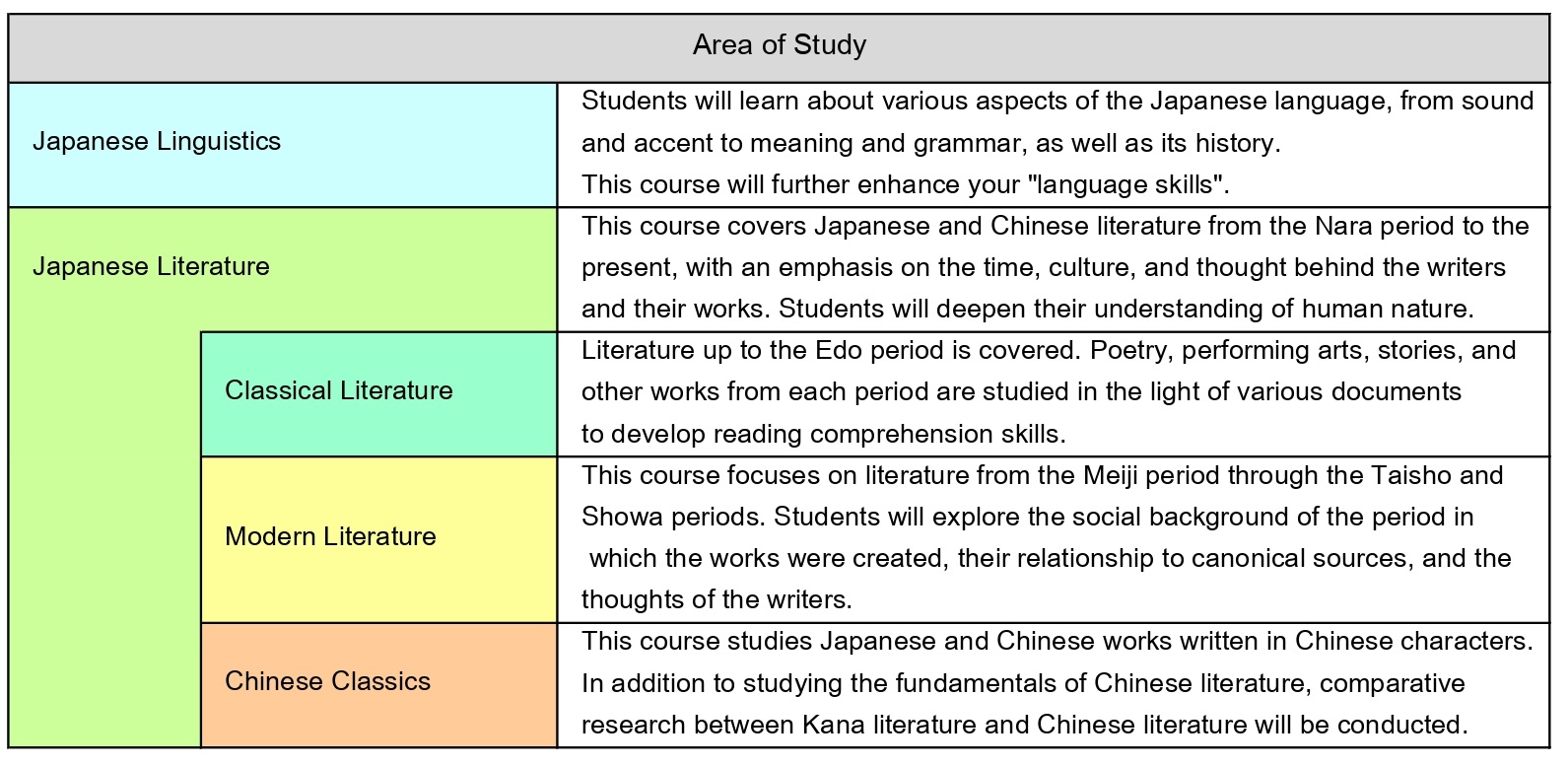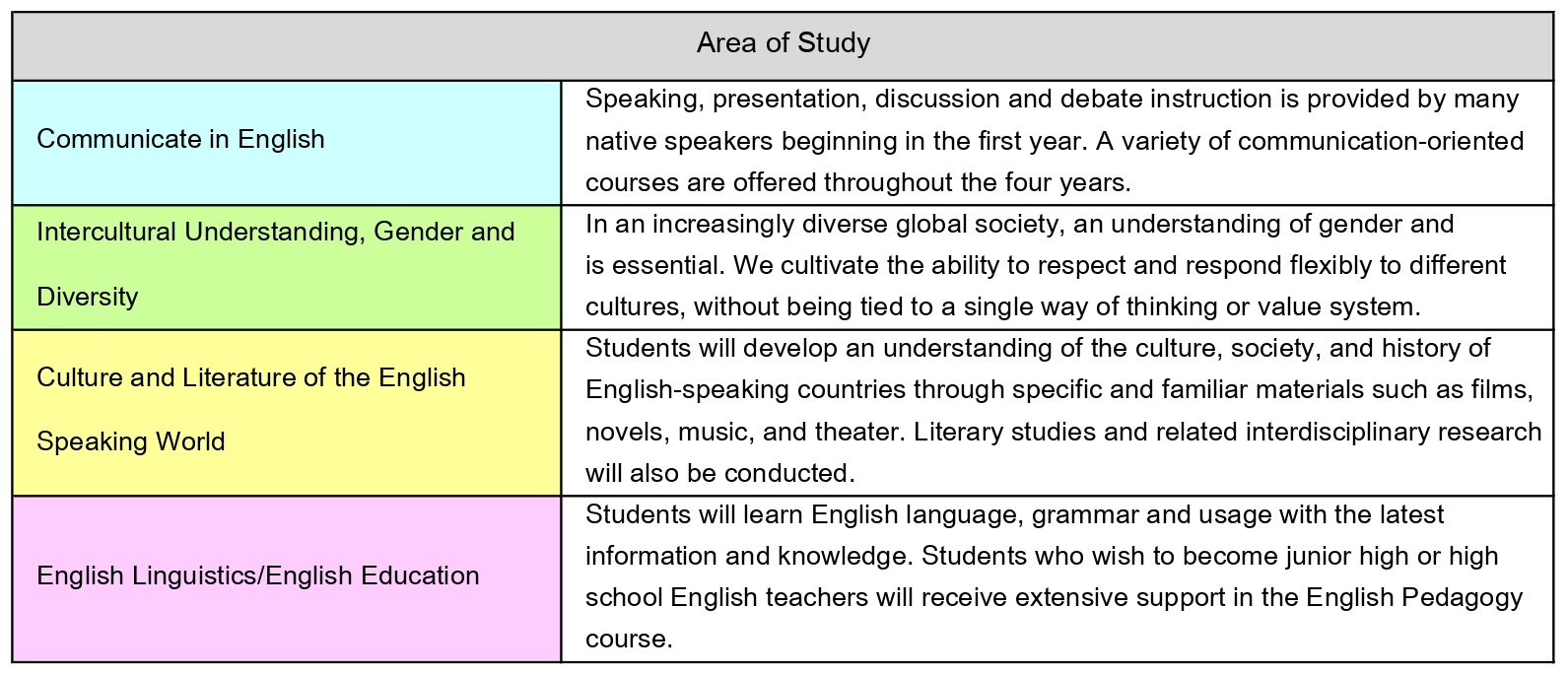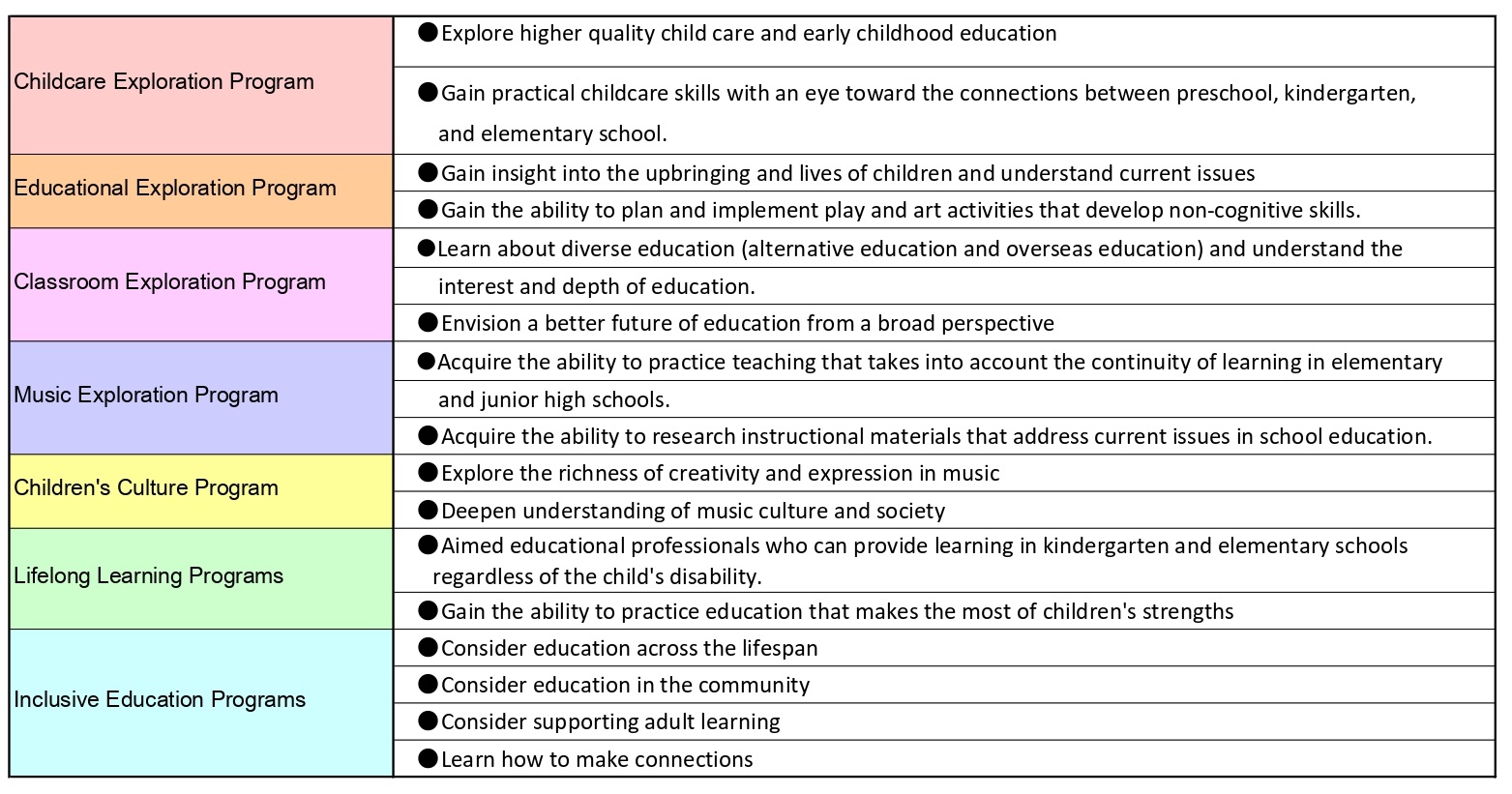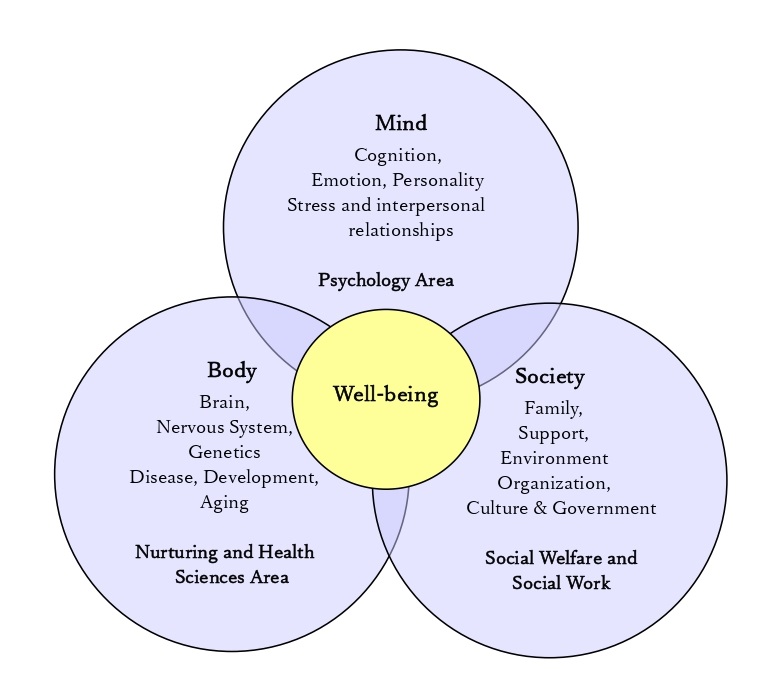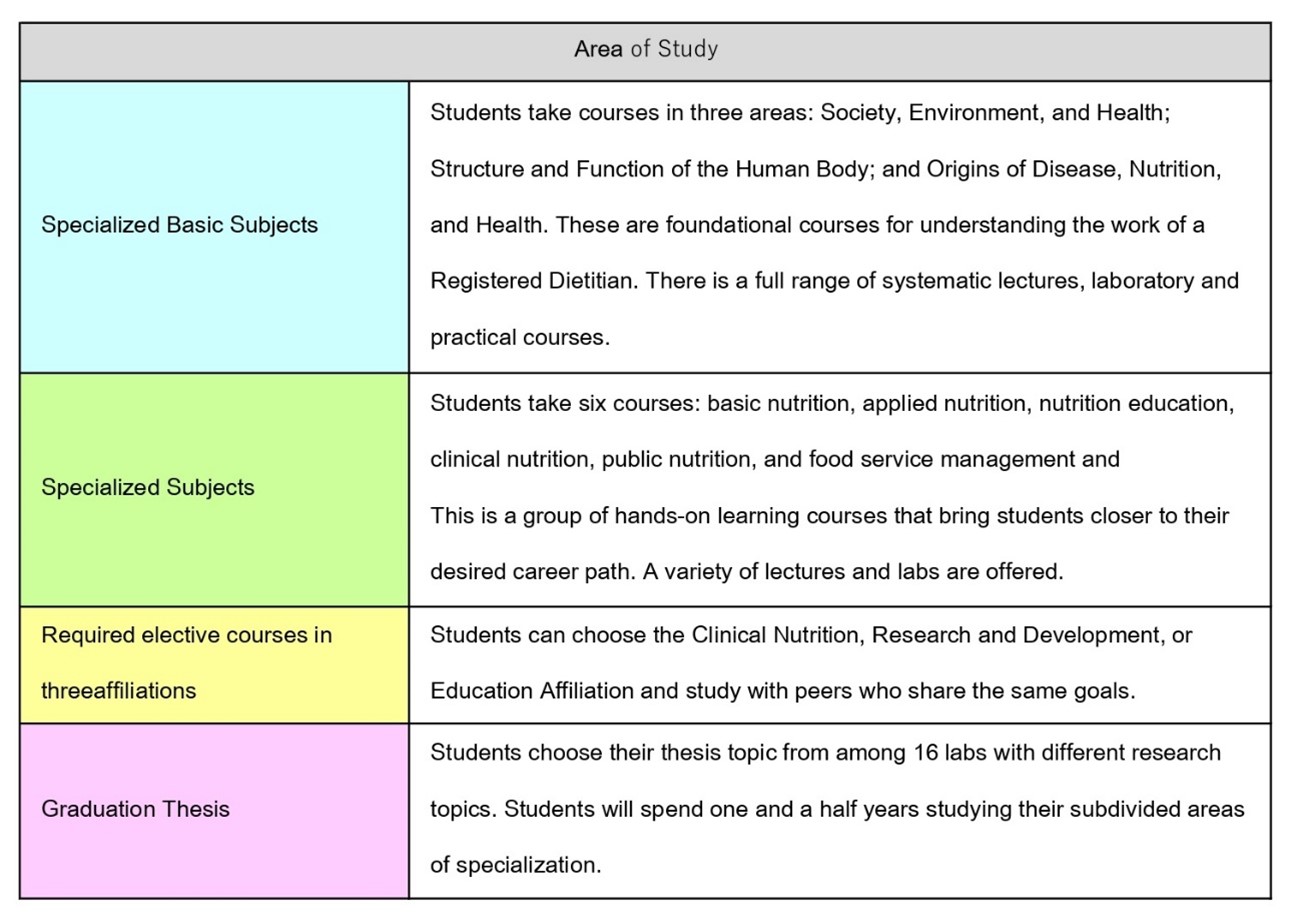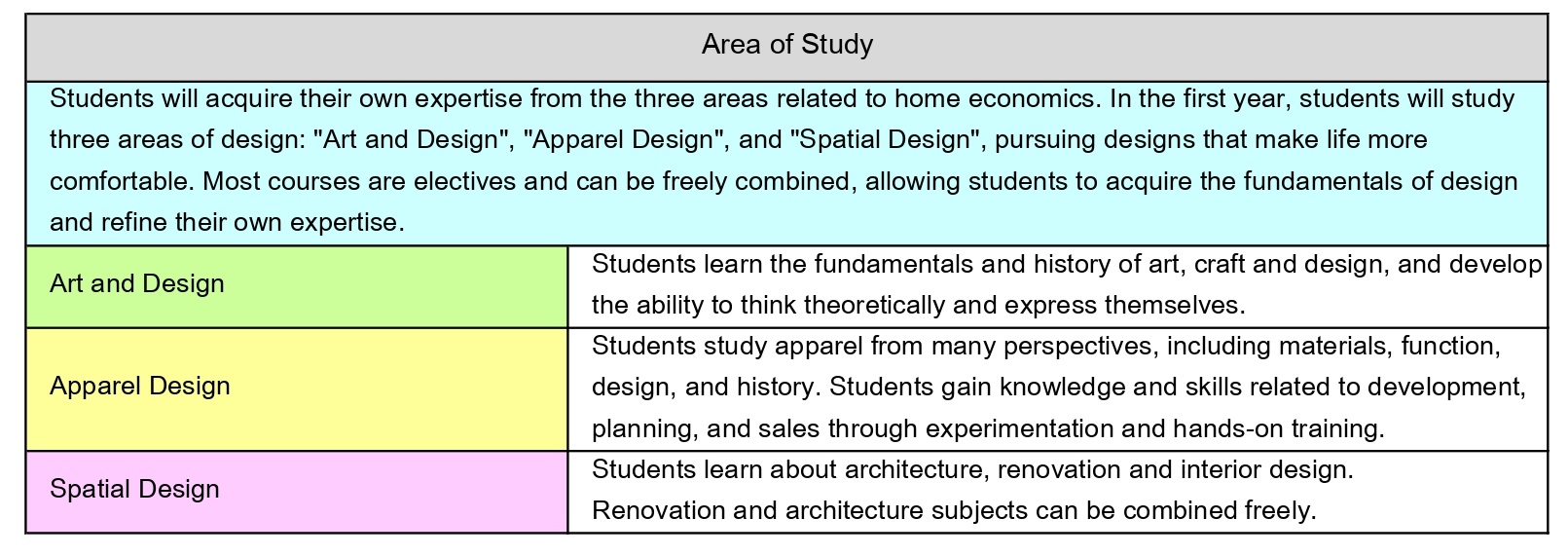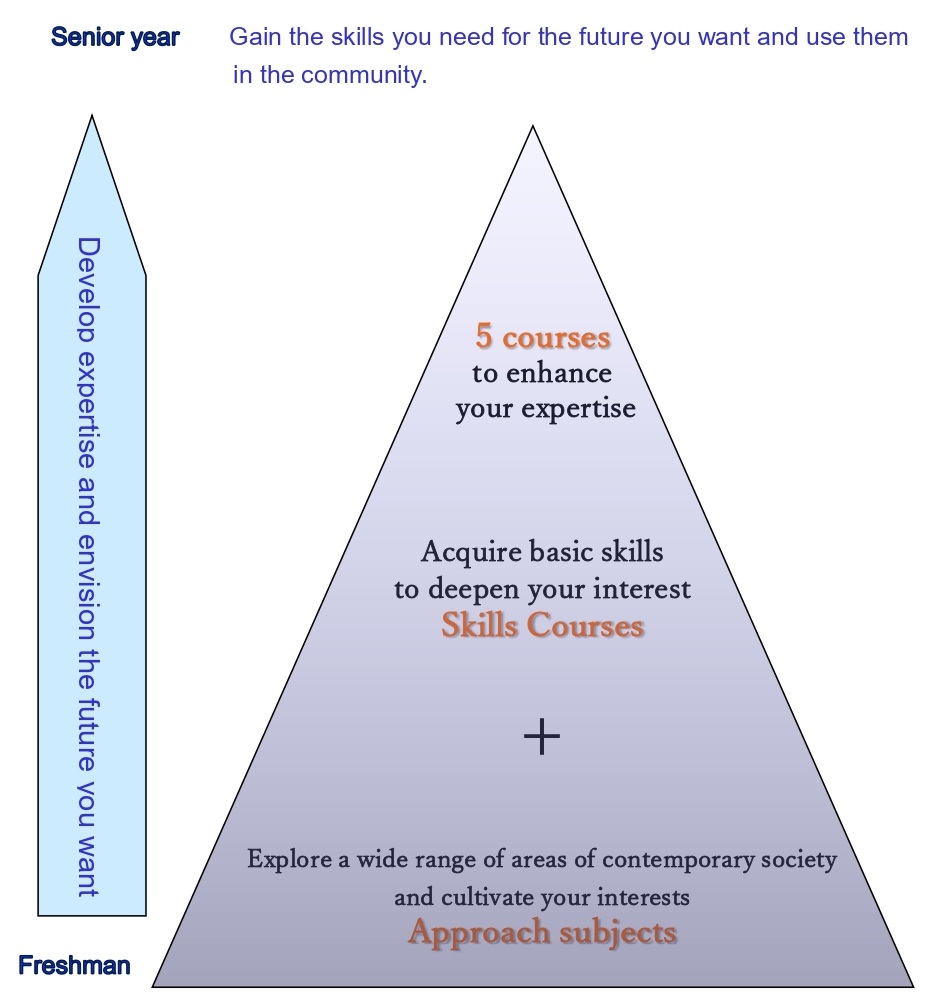
Faculties and Departments
Kyoto Women’s University covers a wide range of fields, including the arts, sociology, education, life sciences, and law. While the fields of study vary widely, each provides students with the tools to think independently and collaborate with others in the Buddhist spirit. The goal is to develop global citizens who are able to identify contemporary issues and meet unforeseen challenges ethically and responsibly.
Each faculty/department pursues a variety of fields appropriate for this age of globalization and information technology. This is accomplished by developing unique expertise and deepening exchange with others. Choose the programs that are best suit for your learning and career goals.
Faculty of Letters
Department of Japanese Language and Literature
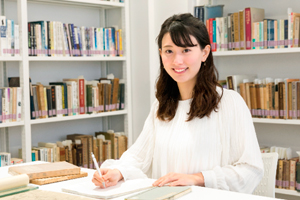

Through the study of Japanese language and literature, this department explores the rich culture, language, and people of Japan. It is most meaningful to pursue these subjects in Kyoto, the setting of many literary works since the Heian period. Since ancient times, Kyoto has been the setting of countless literary works, as well as a city that has fostered a wealth of culture through its connections with foreign rulers. Students deepen their understanding through empirical and logical learning in the areas of Japanese language and literature and international exchange. Graduates use the extensive knowledge they have acquired to make substantial contributions in fields such as education and the media.
Points of Learning
In seminars, students study different academic areas in parallel to pursue specialized research.
From the first to the fourth year, students study in small group seminars. 2nd and 3rd year students choose two of seven different periods and areas of study, and 4th year students choose one of the two chosen in the 3rd year.
Study Japanese literature through hands-on experience, taking advantage of Kyoto's geographical location
Students study literature from classical to modern while experiencing the climate of Kyoto, the setting of many works. Fieldwork at famous and historic sites, museums and art galleries, and appreciation of classical performing arts are also included in the program.
Acquiring Expertise in Japanese Language and Literature and the Ability to Communicate with the World
In addition to acquiring specialized knowledge and thinking skills related to Japanese language and literature, students learn about the relationship between the language, culture, and history of Japan and other countries, and develop the ability to communicate internationally. Knowledge of Japan is the key to becoming a true international citizen.
Fields of Study
The ability to acquire
Investigative and analytical skills
Students will acquire the research and analytical skills required by society by repeatedly researching and analyzing literary works and materials from various aspects and presenting and discussing their findings.
Comprehension and thinking skills
Students will examine the period and society behind the works using period materials, and will also examine related works to gain a multifaceted perspective.
Dialogue and expression skills
Through writing and presenting papers and reports, students will improve their reading, writing, listening, and speaking skills, and acquire high-quality communication skills.
Department of English Culture and Communication
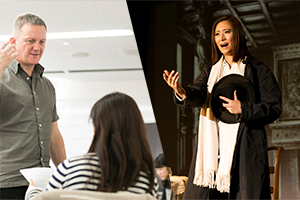

This department focuses on English Communication, Intercultural Understanding, Gender and Diversity, Anglophone Culture and Literature, English Studies, and English Education. Our goal is to develop internationally minded individuals with a deep understanding of English-speaking cultures and the ability to communicate across cultures. The culture of Kyoto has developed through a long history of exchange with foreign countries.
This makes it an ideal place for students to use their English skills to deepen their understanding of the culture and literature of the English-speaking world through empirical and logical learning. Graduates will use the extensive knowledge they have acquired to make substantial contributions to fields such as English education, translation and interpretation, international aid, and the airline and tourism industries.
Fields of Study
A diverse group of topics directly related to careers
Aviation Industry: Airline English, Oral Communication I & II, etc.
Media, Education and General Business: Media English Seminar, English Language Education for Children, etc.
International Business: Business English I & II, Talking about Kyoto in English, etc.
Interpreting and Translation: Interpretation and Translation Theory, English Tour-Guiding Seminar, etc.
Hotel and Tourism: Planning and Executing Travel Plans, Reading about Kyoto in English, Studies in Tourism, etc.
Original Study Abroad Programs in the Department of English Language, Culture, and Communication
The department's original study abroad program is designed to provide students with cross-cultural experiences that are difficult to obtain in Japan and to dramatically improve their English language skills. In addition to our extensive scholarship program, we provide full support for students before and after their study abroad experience. (This program is for those who wish to study abroad.)
Department of History
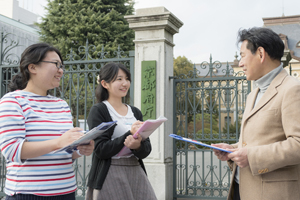

We offer comparative studies in Japanese history, Asian history, and European and American history. Through the collection, study, and analysis of historical materials, students develop their own perspectives on history for present and future use.
Students deepen their understanding of the history of governments, economies, societies, and cultures around the world in a multifaceted, empirical, and logical manner. Graduates will use the breadth of knowledge they have acquired to make substantial contributions to fields such as education, culture, and government.
Points of Learning
After studying Japanese, Eastern, and Western history, students choose the course they wish to study
In the first year, students study Japanese and world history in an interdisciplinary manner; in the second year, students are divided into courses in Japanese, Eastern, and Western history to deepen their specialized studies (any period from ancient times to the present can be studied). Cross-course study is also possible.
Gain diverse perspectives from history and develop the ability to live in the future
History is the study of reading historical materials and documents from unique perspectives.
In the process, students learn how to organize historical materials, how to develop their own interpretations and new ways of looking at history, and how to cultivate the ability to build the future. To become familiar with the Japanese language and literature, in conjunction with acquiring the ability to disseminate information to the world.
Research Environment Surrounded by Historical Heritage and Fieldwork
Surrounded by the Kyoto National Museum, Kiyomizu-dera Temple, Rokuharamitsuji Temple, and Sanjusangen-do, and close to Gion, the area is one of the best places in Kyoto to "experience" history. Taking advantage of this location, fieldwork is also conducted. We provide opportunities for students to come into direct contact with Kyoto's historical sites, historical materials, and historical heritage.
A Wide Variety of Courses for Different Areas of History
Beginning in the second year, students take courses in English, Chinese, Latin, Greek, and reading ancient documents, according to their own research interests. At the same time, students choose from a wide variety of lecture courses on the history of Japan and other regions of the world, depending on the topic and interest they wish to pursue. Students will improve their ability to read and understand historical materials and to write papers from their own unique perspectives.
Fields of Study
Acquire a deep knowledge of history through systematic and empirical study and the ability to apply it in the future.


Japanese History
Students will learn about the history of each period: ancient, medieval, modern, and contemporary. We also offer a study program that brings you into contact with valuable historical sites and materials in Kyoto.
Students will learn about the history of each period: ancient, medieval, modern, and contemporary. We also offer a study program that brings you into contact with valuable historical sites and materials in Kyoto.


Asian History
This course covers a vast region and time period, from China and Korea to Southeast and West Asia. Students will study the interactions and developments of countries and peoples in relation to each other.


Western History
This course covers the history of the region, particularly in Europe, while considering the interrelationships between countries and peoples. Students will also be challenged to decipher original texts written in European languages, including ancient languages.
The ability to acquire
Investigative and analytical skills
- Highly specialized knowledge of history
- Broad knowledge of humanities, society, and nature
- Deep understanding of Kyoto's history and culture
General Skills
- Understand and express yourself in Japanese
- Foreign Language Skills
- Information Skills
Thinking and decision-making skills
- Critical and rational thinking
- Ability to make decisions based on a broad perspective and evidence
- Ability to identify and solve problems independently
Dialogue and Mutual Uderstanding
- Dialogue with appropriate expression, understanding, and attitude
- Mutual understanding of others, including people from different cultures
Faculty of Human Development and Education
Department of Education


This department explores the learning and development of each generation, from children to adults, through seven programs: child care exploration, educational exploration, classroom exploration, music exploration, children's culture, lifelong learning, and inclusive education.
Students acquire knowledge and skills in the field of education as they engage in theoretical and practical study of how people grow to become who they are, gaining both deep insights and a wide range of perspectives on human beings.
This gives them the ability to think for themselves while understanding and working constructively with others in the Buddhist spirit. The result is a global citizen who is able to identify problems for themselves and take on unforeseen challenges in an ethical and responsible manner. Graduates will use the extensive knowledge they have acquired to make a substantial contribution in kindergartens and primary schools, as well as in continuing education in communities and in education-related private enterprises.
Points of Learning
Through classes taught by experts in a variety of fields, students can learn the theory and practice needed in education and child care in a balanced way.
- Classes are taught by researchers in education and child care theory, teachers with extensive experience in school and child care settings, researchers in educational practice, professional performers, music researchers, and others.
- Through classes taught by a variety of experts, students acquire the ability to think, practice, and learn independently, which is necessary to become a teacher.
Students can choose the time and method of their educational training, including practical training at the Elementary School Attached to Kyoto Women's University.
- In the first and second year, observation practice at the affiliated elementary school or kindergarten in Kyoto.
- In the second and third years, internship at the affiliated elementary school or kindergarten/elementary school in the student's hometown.
- For students who wish to become kindergarten teachers, internship at designated kindergartens and children's homes.
Overseas educational fieldwork to cultivate an international mindset
- Students visit Taiwan and Singapore for a week to attend lectures at local universities, interact with students, observe classes in elementary schools, engage in discussions with teachers, and gain cultural experience.
- Credit is awarded for participation in pre- and post-learning activities.
Variety of professional development programs
Faculty of Psychology and Collaboration
Department of Psychology and Collaboration
This department has three specializations: psychology, social welfare, and nursing/health care, and aims to train students to become specialists with the ability to solve problems in the field. Specializations are chosen in the second year or later.
In an increasingly diverse society, it is important to work with multiple specialists rather than with the expertise of one person. Students learn about physical and mental health and support for people in a comprehensive way and develop the ability to provide optimal support for each individual.
Points of Learning
You don't have to be sure what you want to learn!
You can find the area that is right for you!
All students start with a curriculum that teaches the basics of three areas and allows them to explore their own interests in depth. You can choose your career path after deepening your understanding of each career.
Full support for passing national exams and obtaining licenses
As in the past faculties that boasted high pass rates for national exams, we provide full support for students who wish to obtain qualifications and licenses through small group training and mock interviews.
Interdisciplinary Studies in Psychology x Nursing/Health Care x Social Welfare
To cultivate not just one specialty but multiple perspectives, students can study across the fields of psychology, social welfare, and nursing/health care to help improve people's well-being.
Realizing "Healthy and Happy Living" for All People
We provide comprehensive support for each individual's mental, physical, and other concerns and issues with the goal of improving individual well-being and realizing a symbiotic society in which everyone can lead a vibrant life.
Fields of Study
Examine the three domains of mind, body, and society to understand well-being.
Faculty of Home Economics
Department of Food and Nutrition


In this department, students acquire through practice and extensive experimentation the specialized knowledge and techniques needed to become nutrition and health professionals. In their third year, students choose one of three concentrations: clinical nutrition, health education, and research and development. With the advancement of scientific technology, we are surrounded by more and more processed foods, genetically modified products, and chemically treated products. At the same time, lifestyle-related diseases, food allergies and unhealthy eating habits are becoming increasingly serious social problems. In this department, students explore the importance of nutrition education in maintaining and improving health and preventing and curing disease.
By acquiring specialized knowledge about nutrition and health, students aim to qualify as Registered Dietitians. This course aims to develop human resources capable of working in a global environment and acting with a sense of morality and responsibility, even in the face of unexpected challenges. Upon graduation, students are expected to apply what they have learned here in their future careers in areas such as hospitals, social service agencies, day care centers, food service companies, and schools. The department also provides a solid foundation for those who wish to continue on to graduate school.
Points of Learning
Meet alumni working as dietitians (all years, June)
Alumni who have been employed as dietitians or nutrition educators in hospitals, government agencies, or food manufacturers talk about their work, job satisfaction, job search methods, etc. Students are then divided into small groups to ask questions and share information.
Pre and Post Guidance to Deepen Learning in Off-Campus Training (3rd Year)
Pre- and post-teaching is provided to each small group of two to four students. Because each hospital or institution has different needs and each student has different strengths and weaknesses, careful mentoring leads to better learning.
National Dietetic Examination Preparation Courses (4th year students)
In parallel with their thesis research, fourth-year students prepare for the National Dietetic Examination by taking six practice exams and weekly lectures to help them pass the exam. Many students pass the exam each year.
Fields of Study
Department of Apparel and Space Design
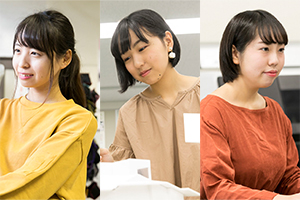

This department explores the various aspects that make the human environment comfortable. Students learn how communication design, apparel, interior design, and architecture contribute to the creation of a rich lifestyle. These subjects are studied from the perspective of "monozukuri" (making things), also known as the spirit of craftsmanship.
Students in this department study craft and design, clothing design, and spatial design with the goal of learning how to create comfortable living environments that maintain harmony with nature. From a scientific perspective, students take an empirical and logical approach to creating comfortable living environments. Upon graduation, students are expected to apply what they have learned here in their future careers in fields such as clothing, textiles, architecture, interior design, etc.
Points of Learning
First-year students learn the fundamentals of "Art and Design", "Apparel Design", and "Spatial Design".
In the first year, students study three areas of design to pursue designs that make life more comfortable, and they can choose to study one area or all three. Most courses are electives and can be freely combined, allowing students to acquire the fundamentals of design and refine their own expertise.
Licenses and certifications such as Architect, Textiles Advisor, Curator, and Home Economics Teacher are also available.
In addition to qualifying to take the Level 1 and 2 Architect exams, students can also obtain licenses to teach Home Economics at the junior and senior high school levels and to become a Curator and Level 1 Certified Textiles Advisor. In addition, students can qualify to take the Certified Associate Ergonomics Professional.
Practical, community-based education and a full range of activities unique to Kyoto
The Institute for Design for Living was established on campus to conduct design activities in cooperation with local governments and companies. Students present the results of their creations and research and cultivate practical skills.
In addition, design activities are also developed through contact with culturally valuable architecture, arts and crafts, kimono culture, and other unique experiences unique to Kyoto.
Fields of Study
Build your own expertise in three areas related to design
Faculty of Contemporary Society
Department of Contemporary Society
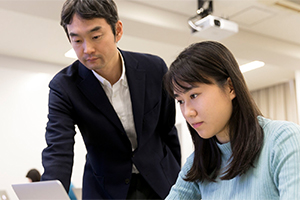

This department provides a systematic and empirical study of the various disciplines necessary to understand contemporary society. Students deepen their specialized knowledge and understanding in disciplines ranging from the natural sciences to the humanities and social sciences, while acquiring a broad range of liberal arts, general skills, and global perspectives. Based on this knowledge, understanding, and skills, we will enable students to develop the ability to learn independently, to seek mutual understanding with others, and to discover and solve problems independently. After graduation, we produce graduates who can work in fields that utilize their in-depth knowledge of various areas of modern society, such as general corporations, government agencies, municipalities, NGOs, and NPOs.
Points of Learning
First, students learn broadly and explore areas of interest.
Students are not required to declare a major at the time of enrollment; they may study a wide range of subjects in their first year to find an area of interest, and then begin to specialize in their chosen major in their second year. It is also possible to take courses outside of the selected field of study.
Small group seminars are offered to all years.
Small group seminars are offered to all students in their first through fourth years. Students broaden their perspectives in their first and second years and conduct research in specialized areas in their third and fourth years.
Many opportunities for off-campus study, including field work
KWU supports off-campus activities such as field work, corporate internships, joint seminars with other universities, overseas training, and study abroad. Students learn about themselves and contemporary society by interacting with a wide variety of people.
Fields of Study
Four years of exposure to a wide range of fields, developing the ability to deepen your interests and progress into your favorite field.
Approach subjects
This is a group of subjects designed to expose students to the diverse studies offered by the Department of Contemporary Society. While approach subjects expose students to a wide variety of studies, students identify an area of interest or topic they wish to pursue and select a course in their second year.
Skills courses
A group of subjects that provide students with the skills necessary for further study. The knowledge and skills learned in skills courses are useful for living in society.
-
English
- Lectures on contemporary society through the reading of English reference works are also taught by native English speakers. In the Short-Term English Program, students practice their practical English skills overseas.
-
Research
- Students systematically learn research techniques through questionnaires, interviews, and fieldwork, and acquire the research skills necessary for working adults.
-
Information
- Students will gain a deep understanding of the relationship between ICT and society, while at the same time acquiring practical skills in programming and networking.
5 Courses
From the second year onwards, students choose courses according to their own interests. Students can explore their own topics in an proactive and professional manner, and can also study across disciplines.
-
Culture and Psychology Courses
- Students learn about the psychology of individuals in society, human thought, and the norms and culture created by groups.
-
Family and Community Courses
- Students learn about familiar groups and societies, such as families and communities, and their relationships and changes.
-
Economics and Business Courses
- Learn more about how the economy works, personal decisions, and business.
-
Environment and Public Affairs Courses
- Students learn practical social institutions and public policies to meet the challenges of creating a sustainable society.
-
Politics and International Relations Courses
- Students study Japanese and international society, mainly from a political perspective, to gain a broad perspective.
Faculty of Law
Department of Law
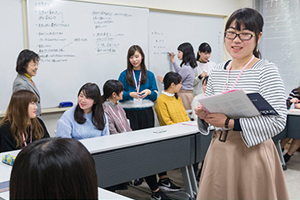

Today, our societies are governed by a wide variety of laws. Therefore, women with legal problem-solving skills are likely to be in demand regardless of their profession and field of activity. As the first law department established by a women's university in Japan, we offer a unique curriculum. We focus on the gender perspective to provide students with legal problem-solving skills tailored to their daily needs, while providing a better understanding of law and humanities.
Students in this department learn to discover and solve various legal problems in today's highly complex societies. In the process, they cultivate the knowledge and skills necessary to act from a legal perspective and contribute to the welfare of citizens. Our goal is to develop citizens who are able to discover problems on their own and face unexpected challenges with ethics and responsibility in today's globalized world. Students will use their extensive knowledge to make substantial contributions to various legal issues after graduation.
Points of Learning
Cultivate a legal mindset and cultivate the ability to live in the future
With the goal of fostering women with the ability to solve legal problems, students acquire a broad knowledge of the law and how to think legally, while also honing their practical skills through graduation research, the culmination of four years of study, and developing the ability to be active in diverse fields.
Cultivate the ability to deal with legal practice through practical law courses
The Practical Law courses help students acquire various qualifications and pass civil service examinations through regular classes.
Small-group seminars provide training tailored to individual career paths and personalities.
From first-year to fourth-year students, faculty members provide in-depth guidance, deepen expertise, and cultivate communication skills through discussions and presentations.
Fields of Study
Faculty of Data Science
Department of Data Science
In the coming era, when all industries will be driven by AI and data, the ability to read data and use it to solve problems has become an essential skill. The Faculty of Data Science will introduce a program that integrates the humanities and sciences to help students acquire the sensitivity to discover diverse issues in society and the skills to collect, analyze, and use appropriate data to solve problems.
These skills will also lead to flexible work styles that are not limited by time and place, and will provide women, who are easily affected by life events, with the ability to survive in the future society and support their careers. We will work with government and business to develop human resources to promote the success of women, who are essential to the sustainable development of society.
Points of Learning
Acquiring data science with care
Students learn the fundamentals of statistics and computer science. In addition, we cultivate a broad knowledge of how to apply data science to solve societal problems. In addition, we have established a system of ability-based classes, tutoring, and individualized support so that students can learn with ease, even if they are not good at math.
Acquiring the Ability to Live in the Real World by Working with Companies and Local Governments
Areas of Study Collaborating with companies and local governments, PBL (Problem-Based Learning) is mandatory to create new value and solve social problems. Students learn the latest case studies of data science in local governments and companies, and in their upper year, they make proposals on issues such as the environment, economy, culture, and local communities.
Acquiring a liberal arts education that contributes gender equity
The mission of our department is to increase women's participation in decision-making through the study of data science, which enables data-driven proposals.
We contribute to gender equality by fostering innovation in the field of data science, where women are underrepresented, and by developing human resources to serve as leaders.
